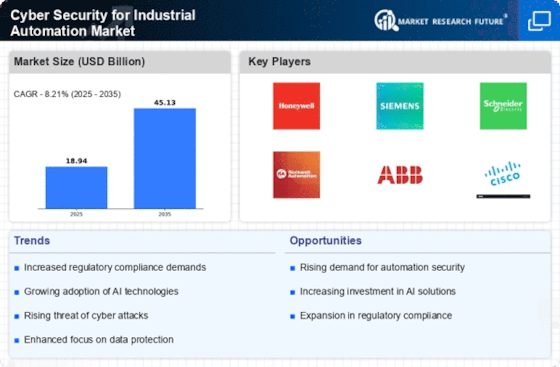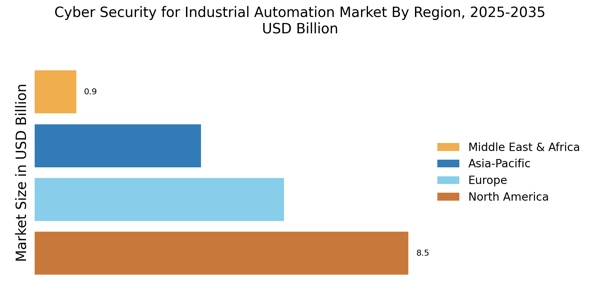Increasing Cyber Threats
The Cyber Security for Industrial Automation Market is experiencing heightened demand due to the increasing frequency and sophistication of cyber threats. As industrial systems become more interconnected, they are more vulnerable to attacks that can disrupt operations and compromise sensitive data. Reports indicate that cyber incidents targeting industrial automation systems have surged, prompting organizations to invest in robust security measures. The potential financial losses from such breaches can be substantial, with estimates suggesting that the cost of cybercrime could reach trillions annually. This alarming trend underscores the necessity for enhanced cyber security solutions tailored for industrial environments, driving growth in the Cyber Security for Industrial Automation Market.
Rising Adoption of IoT Devices
The proliferation of Internet of Things (IoT) devices in industrial settings is a key driver for the Cyber Security for Industrial Automation Market. IoT devices enhance operational efficiency and data collection but also expand the attack surface for cyber threats. As industries increasingly adopt IoT technologies, the need for robust cyber security measures becomes paramount. Reports indicate that the number of connected devices in industrial environments is expected to reach billions in the coming years. This rapid growth necessitates the implementation of advanced security protocols to safeguard these devices and the networks they operate on. Thus, the Cyber Security for Industrial Automation Market is poised for significant expansion as organizations prioritize IoT security.
Regulatory Compliance Pressures
Regulatory compliance is a critical driver for the Cyber Security for Industrial Automation Market. Governments and regulatory bodies are increasingly mandating stringent security standards to protect critical infrastructure. Compliance with regulations such as the NIST Cybersecurity Framework and the EU's GDPR is essential for organizations operating in industrial sectors. Failure to adhere to these regulations can result in severe penalties and reputational damage. As a result, companies are compelled to invest in comprehensive cyber security strategies to ensure compliance, thereby fueling the growth of the Cyber Security for Industrial Automation Market. The market is projected to expand as organizations prioritize compliance-driven security investments.
Integration of IT and OT Security
The convergence of Information Technology (IT) and Operational Technology (OT) is a significant trend influencing the Cyber Security for Industrial Automation Market. As organizations seek to streamline operations and enhance efficiency, the integration of IT and OT systems has become increasingly prevalent. However, this convergence also introduces new vulnerabilities, as traditional IT security measures may not adequately protect OT environments. Consequently, there is a growing demand for specialized cyber security solutions that address the unique challenges posed by this integration. The Cyber Security for Industrial Automation Market is likely to see substantial growth as companies invest in solutions that provide comprehensive protection across both IT and OT domains.
Investment in Advanced Security Technologies
Investment in advanced security technologies is a driving force behind the growth of the Cyber Security for Industrial Automation Market. Organizations are increasingly recognizing the importance of adopting cutting-edge solutions such as artificial intelligence, machine learning, and advanced threat detection systems. These technologies enhance the ability to identify and respond to cyber threats in real-time, thereby minimizing potential damage. The market for these advanced security solutions is projected to grow substantially, as companies seek to bolster their defenses against evolving cyber threats. This trend indicates a shift towards proactive security measures, positioning the Cyber Security for Industrial Automation Market for continued growth as organizations prioritize technological advancements in their security strategies.

















